Peloponnesian War
Peloponnesian War: name of the conflict between Athens and Sparta that broke out in 431 and continued, with an interruption, until 404. Athens was forced to dismantle its empire. The war however, was not decisive, because within a decade, the defeated city had regained its strength. The significance of the conflict is that the divided Greeks could not prevent the Persian Empire from recovering their Asian possessions. Besides, this violent quarter of a century had important social, economic, and cultural consequences.
1: Sources
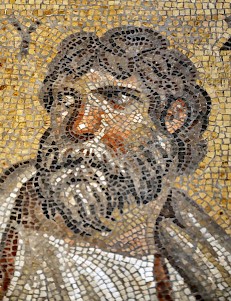
Our main source for the Peloponnesian War is the History by the Athenian author Thucydides. He is a great historian who sincerely tries to be objective, but his work must be read with caution, because - in spite of himself - he has his sympathies (e.g., for Hermocrates and Nicias) and antipathies (e.g., Cleon and Theramenes). Modern scholars offer interpretations of the war that are different from Thucydides'.
Other sources are inscriptions, a couple of contemporary speeches, remarks in the Histories by Herodotus of Halicarnassus, references in Aristophanes' comedies, Xenophon's Hellenica, the Athenian Constitution by an anonymous student of Aristotle of Stagira, Books 12-13 of the Library of World History by Diodorus of Sicily and the Lives by Plutarch of Chaeronea. (The two last-mentioned authors lived during the Roman empire but used older sources like Ephorus of Cyme.)
2: Outline
2.1: Causes
When Athens concluded an alliance with Corcyra (modern Corfu) in 433, and started to besiege Potidaea, it threatened the position of Corinth. Sparta also feared that Athens was becoming too powerful but tried to prevent war. Peace was possible, the Spartans said, when Athens would revoked measures against Sparta's ally Megara. The Athenian leader Pericles refused this, because Sparta and Athens had once agreed that conflicts would be solved by arbitration. If the Athenians would yield to Sparta's request, they would in fact be accepting Spartan orders. This was unacceptable, and war broke out: Athens and its Delian League were attacked by Sparta and its Peloponnesian League. Diodorus mentions that the Spartans did not just declare war, but decided to declare war and ask for help in Persia.note
2.2: Archidamian War (longer version)
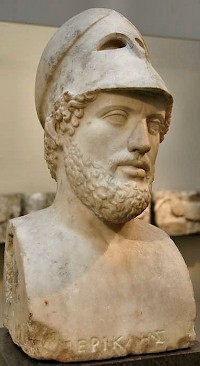
When Sparta declared war, it announced that it wanted to liberate Greece from Athenian oppression. And with some justification, because Athens had converted the Delian League, which had once been meant as a defensive alliance against the Persian Empire, into an Athenian empire.
To achieve victory, Sparta had to force Athens into some kind of surrender; on the other hand, Athens simply had to survive the attacks. Pericles' strategy was to abandon the countryside to the Spartans and concentrate all Athenians in the city itself, which could receive supplies from across the sea. As long as the "Long walls" connected the city to its port Piraeus, as long as Athens ruled the waves, and as long as Athens was free to strike from the sea against Sparta's coastal allies, it could create tensions within the Spartan alliance.
In 431 and 430, the Spartan king Archidamus II invaded Attica (the countryside of Athens) and laid waste large parts of it. The Athenian admiral Phormio retaliated with attacks on the Spartan navy (text). However, it soon became apparent that Pericles' strategy was too expensive. Worse was to come, because in 429, a terrible plague took away about a third of the Athenian citizens, including Pericles. At the same time, the Spartans laid siege to the Athenian ally Plataea (text), which fell in 427.
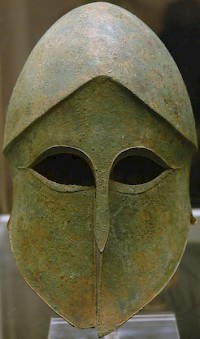
Believing that Athens was about to collapse, the island of Lesbos revolted and Archidamus invaded Attica again. However, the Athenians were not defeated at all. They suppressed the revolt and at the same time embarked upon a more aggressive policy, even launching a small expedition to Sicily. In 425, the Athenian general Demosthenes and the statesman Cleon, who had earlier tripled the Athenian income and had saved Athens from bankruptcy, captured 292 Spartans on the island Sphacteria (text). The Athenians also built a fortress at Pylos, where they could receive runaway slaves and helots. This did great damage to the Spartan economy.
For the Spartans, invading Attica was now impossible (the POWs would be executed), so they attacked Athenian possessions in the northern Aegean. The Spartan Brasidas provoked rebellions in this area and captured the strategically important Athenian colony of Amphipolis (text). (The Athenian Thucydides, who could not save the town, was punished with exile and became this war's historian.)
When Cleon and Brasidas were killed in action during an Athenian attempt to recover Amphipolis, a treaty was signed: the Peace of Nicias (421). Athens had won the Archidamian War.
2.3: The entr'acte (longer version)
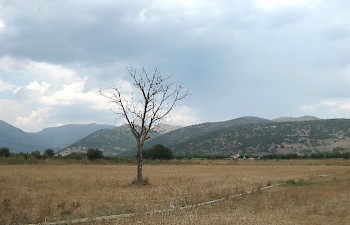
The next years witnessed a continuation of the war with diplomatic means. Athens and Sparta had concluded a defensive alliance, but on both sides, there were politicians who wanted to resume the war. The Spartans did not return Amphipolis, as they had promised, and the Athenians retaliated by keeping Sphacteria and Pylos.
Now, the Athenian politician Alcibiades launched a new policy that promised the collapse of the Peloponnesian League without much Athenian involvement. Following his advice, the Athenians joined a coalition with three democratic states on the Peloponnese: Argos, Mantinea, and Elis. Athens now had friends in the Spartan backyard and had cut off the route between Sparta and its northern allies Corinth and Thebes.
The Spartans knew how to reply. If it attacked the Athenian allies, Athens would be forced to choose between either its Spartan alliance (which meant abandoning its allies), or its treaty with the three democratic cities (and risking an open war with Sparta in the Peloponnese). As it turned out, Athens preferred the second alternative, and when Spartan king Agis II marched to the north, Athens supported the democrats. In 418, a battle was fought at Mantinea, and the Spartan king Agis defeated his enemies (text).
As a result, Sparta restored its prestige, the quadruple alliance was dissolved, and democracy suffered a severe blow. The prestige of the frustrated Athenians needed a boost, and at this point they made the fatal mistake for which they would pay with the loss of their empire. In 420, the satrap of Lydia, Pissuthnes, had revolted against the Achaemenid king Darius II Nothus. The great king's representative Tissaphernes arrested the rebel and sent him to Darius, who had him executed. Pissuthnes' son Amorges, however, continued the struggle and received help from Athens. Consequently, Darius would ultimately side with Sparta.
2.4: The Sicilian Expedition (longer version)
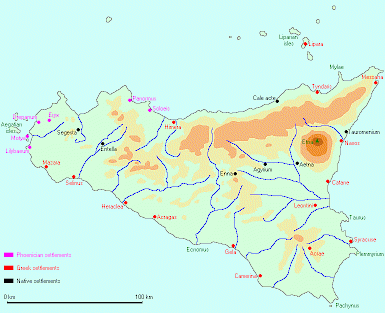
As already noticed above, an Athenian navy had already shown itself in the far west in 427, and the Athenians had allies on Sicily. After Sparta and Athens had concluded a peace treaty in 421, the Athenians had their hands free and sent out an armada to conquer the island. Some, including the popular leader Hyperbolus, wanted even bigger things, like an attack on Carthage. For the time being, however, the plan was to conquer Sicily only. The commanders were Lamachus, Nicias, and Alcibiades. In 415, the expedition started.
The first year of the Sicilian war was more successful for the invaders than for the defenders. The Athenians created a base in Catana and defeated the Syracusans in battle. Still, they had not won the war yet, and the death of Lamachus, the recall of Alcibiades (who was involved in a religious scandal), and an illness of Nicias created serious problems.
During the winter of 415/414, the Syracusan democratic leader Hermocrates convinced his compatriots to extend their city's fortifications and reorganize the structure of command. The new system, however, was not a great improvement, and the Athenians laid siege to Syracuse.
The arrival of a Spartan military adviser, Gylippus, turned the tables. Although the Athenians sent reinforcements to Syracuse, commanded by Demosthenes, they lacked cavalry. To make matters worse, in 413, the Spartans declared war upon Athens, which made it impossible to send the additional reinforcements. In the end, the Athenian expeditionary force was completely destroyed (text).
2.5: The Decelean or Ionian War (longer version)
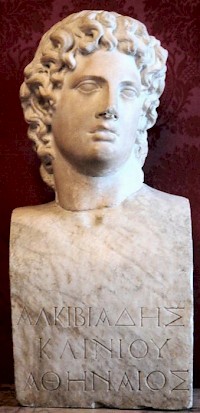
Many people believed that the end of the Delian League was near. Athens had no experienced leaders anymore: Alcibiades was in exile and lived in Sparta, Demosthenes, Lamachus, and Nicias were dead, and the popular Hyperbolus had been ostracized.
Even worse, he Spartan king Agis had built a fortress in Attica, at Decelea. The countryside was now constantly pillaged and the Athenians no longer had access to the silver mines of Laureion. Meanwhile, the Peloponnesian League dared to send a fleet to the Aegean Sea. The satraps Tissaphernes of Lydia and Pharnabazus of Hellespontine Phrygia offered money to Sparta, both hoping to achieve military support for the great king's aims in return.
Because the Spartans had hardly any naval experience, they had to turn to an Athenian when Chios revolted from Athens: Alcibiades. He led the Spartan fleet to Chios, reinforced the insurrectionists and made sure that the revolt pread to other towns.
At this moment, the Spartans concluded a treaty with king Darius II Nothus, who offered pay for the Spartan navy (412/411). Tissaphernes was to be the king's agent, but he believed that an unconditional alliance with Sparta was not in the interests of Persia, so he delayed payments and more than once threatened to negotiate with Athens.
The Persian-Spartan coalition ultimately brought down Athens, but the city was not defeated yet. Athens had faced a similar coalition in 461-448 and back then, it had achieved remarkable results. However, after the Sicilian disaster, this was no longer possible. Still, the Athenians responded to the challenge, founded a base on the isle of Samos, and attacked Chios.
At this point, Alcibiades told the Athenians that he would bring over the great king to their side if Athens recalled him and gave up its democracy. Indeed, a man named Peisander conducted an extreme oligarchic coup in Athens in 411 (text). Among the other leaders of the Four Hundred were Antiphon, who sincerely believed that oligarchy was preferable to democracy, and a general named Theramenes, who argued that if the suspension of democracy could bring Persian support, it was worth a try. From the very first start, the oligarchs were divided.
A new crisis faced the Athenians when the cities near the Hellespont revolted, including those on the Bosphorus. This imperiled the Athenian grain supply, and the men on the Athenian fleet - led by Thrasybulus - recalled Alcibiades. More or less at the same time, a Spartan fleet occupied Euboea, where the Athenians had left their cattle. In this crisis, the Four Hundred were replaced by the moderate oligarchy that had been proposed by Theramenes. Power now was in the hands of the Five Thousand, i.e., those who "served the state with a horse or a shield".
Meanwhile, the Spartans decided to move the war to the Hellespont and cut off the grain supply of Athens. Admiral Mindarus brought the Spartan fleet to the north, but was defeated by the Athenian admirals Thrasybulus and Thrasyllus. When the year 410 started, all Athenian commanders - Alcibiades, Theramenes, Thrasybulus, and Thrasyllus - were in the Hellespont, where they decisively defeated the Spartan navy near Cyzicus. Its admiral Mindarus was killed in action.
The Spartans now offered peace but the Athenian popular leader Cleophon, who did not trust the Spartans after their hesitation to implement the terms of the Peace of Nicias, convinced the people that it was better to refuse. The rejection of the peace offer may have been the moment when democracy was restored.
Now, the war came to a standstill. Sparta was unable to strike and the Athenian democrats were not happy with the successful admirals: after all, Alcibiades, Theramenes, Thrasybulus, and Thrasyllus had collaborated with the oligarchs. They were left in office, but were not reinforced. Still they recovered some ground in Ionia and regained control of the Bosphorus. It seemed as if the Athenians were slowly winning the war after all.
However, one of Alcibiades' deputies was defeated in a battle near Notion and the Athenians sent Alcibiades away from their city again, and this time for good. This gave new self-confidence to the Spartans. Their new and capable admiral Lysander was lucky to find a new satrap in Lydia, prince Cyrus the Younger, who had orders to support Sparta unconditionally.
Athens was now doomed. In 406, it was still able to defeat the Spartans in a naval battle at the Arginusae, but a gathering storm prevented the victorious admirals from picking the survivors from the water. Back home, they were condemned to death.
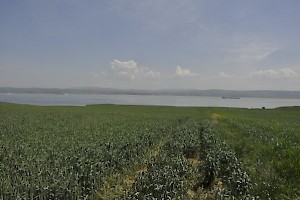
Again, Athens had no experienced commanders. In 405, Lysander was active in the Hellespont and defeated the Athenians at the Aigospotamoi. Their entire fleet was destroyed (text). The war was over: only the capture of Athens remained. Three Spartan armies, commanded by king Agis, king Pausanias, and Lysander, started to besiege the city.
During the winter, Theramenes conducted negotiations, and in April 404, Athens surrendered (text). It gave up its empire, joined the Peloponnesian League, and accepted a regime of thirty oligarchs, which included the radical Critias and the moderate Theramenes (text). According to Xenophon, the Spartans "tore down the Long Walls among scenes of great joy and to the music of flute girls".note
2.6: Aftermath (longer version)
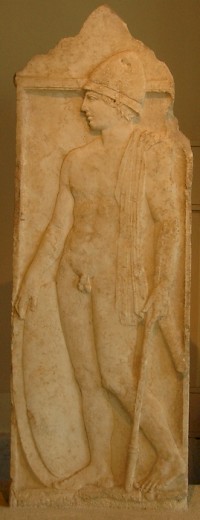
The regime of the Thirty was impopular and alienated Sparta from its friends. The Thebans grew suspicious of the Spartan occupation of Athens, and started to support the democrats under Thrasybulus, who occupied Phyle, a fortress on the border of Attica and Boeotia.
The Thirty were divided and tried to close their ranks. An even closer association with Sparta seemed the best way to remain in power, and the moderate Theramenes was executed. At the end of 404, the democrats took Piraeus and started a civil war that lasted until September 403, when the Spartan king Pausanias restored democracy (text).
Sparta owed much to prince Cyrus, who needed help when his father Darius II Nothus was in 404 succeeded by Artaxerxes II Mnemon. The Spartan Clearchus, probably acting with tacit approval of his government, supported Cyrus when he revolted. Many Greek mercenaries joined the expedition, which culminated in 401 in the battle of Cunaxa, in which Cyrus was killed.
After this, the Spartans interfered even more in the Persian zone of influence. King Agesilaus invaded Asia and had considerable success. Now, the Persians started to support Athens, which rebuilt its Long Walls (395). Next year, Conon, the Athenian admiral who had fallen into disfavor after the battle at the Aigospotamoi, returned with a large fleet. Athens had fully recovered.
Or so it seemed. Of course, it owed its restoration to Persian money. The only victor in the Peloponnesian War was the great king.
3: Consequences
- In Athens, the democratic system survived. Even without the income generated by the empire, democracy proved to be a well-functioning political system.
- This can partly be explained from the fact that during the war, the economy of Athens changed. Once, most Athenians had been peasants; after the outbreak of the Decelean War, trade and commerce became increasingly important. These activities were almost as profitable as the old empire.
- Thebes increased in strength and became a major power. Sparta, on the other hand, only temporarily benefited from its victory. Its social structure was unsuited for a world larger than the Peloponnese. In the fifth century, Greece had been a bipolar political system, but changed into a multipolar system.
- The great victor was, of course, Persia. Not only did it regain the Greek towns in Asia, but it was to have great diplomatic influence among the "Yaunâ".
- Many people had been exiled and had become mercenaries to make a living. Others had become professional soldiers because they could no longer return to their farms. Warfare became a specialism.